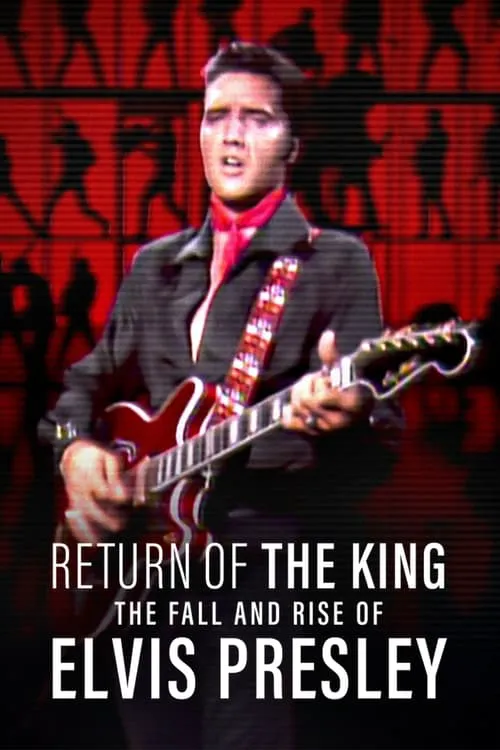Return of the King: The Fall and Rise of Elvis Presley

Plot
In the late 1960s, Elvis Presley's once-glorious reign as the King of Rock 'n' Roll began to show signs of fatigue. Having dominated the charts and screens for over a decade with an unparalleled energy and style, Elvis had become disillusioned with his image as a Vegas performer, donning lavish costumes and delivering over-rehearsed stage shows. The world that once worshipped him had now begun to distance themselves, and his career teetered on the brink of decline. It was in 1967 that Elvis reached a critical point. A recent marriage to Priscilla Presley had brought him a sense of stability, but the pressure to produce hits continued to mount. Despite a string of mediocre releases, Elvis was far from done. Within his fragile ego and deep-seated insecurity, a glimmer of determination sparked. Elvis saw an opportunity to reclaim his artistic throne and redefine his image for a new generation. The solution came in the form of a groundbreaking television special, designed to reinvigorate his image and reignite public interest. The ambitious project, spearheaded by producer Steve Binder, aimed to transform Elvis into a modern, contemporary artist, stripping away the glitz and kitsch of his Vegas shows. It was a chance for Elvis to prove he could still cut it in a rapidly changing musical landscape. As preparations for the special kicked into high gear, the stakes were high, both creatively and personally. Elvis was keen to reconnect with his early rockabilly roots, and his team recognized an opportunity to capitalize on the emerging folk-rock scene, led by artists like Bob Dylan and the Beatles. This vision would see Elvis trading in his gold lamé suits for more subdued attire, incorporating contemporary musical styles, and performing raw, emotional renditions of new songs. However, not everyone within Elvis's inner circle was convinced of the project's potential. The Colonel, Elvis's shrewd manager, Tommy Parker, believed in maintaining the status quo, fearing a drastic change would alienate Elvis's existing fan base and jeopardize future commercial prospects. The Colonel's reluctance put Elvis in a precarious position: between staying faithful to his established image or risking everything to reinvent himself. Meanwhile, Elvis immersed himself in rehearsing the special with his talented team, comprised of experienced musicians, writers, and producers from different corners of the industry. As the sessions progressed, the boundaries between Elvis's public persona and private individual began to blur, exposing him to new sounds and perspectives that challenged his artistic identity. His creative partners, particularly the innovative pianist Glen D. Hardin, instilled a renewed sense of purpose within Elvis, inspiring him to tackle ambitious projects that pushed the boundaries of his craft. One pivotal collaboration emerged between Elvis and the celebrated young songwriter, Mac Davis. Working closely with Davis, Elvis co-wrote a string of heartfelt songs, like "Suspicious Minds," and "In the Ghetto," which reflected a deeply personal and contemporary perspective. These compositions, though initially polarizing the Colonel, marked a pivotal turning point for Elvis, who began to grasp the transformative power of reinvention. Through the grueling rehearsal process, a reinvigorated Elvis emerged, driven by a fierce passion and renewed sense of purpose. This creative resurgence had a profound impact on his relationships with family and loved ones, in particular Priscilla, whose quiet strength and unwavering support gave Elvis the courage to take risks. On June 27, 1968, the world watched with immense anticipation as Elvis Presley took to the stage of the International Hotel in Las Vegas for the long-awaited special. Titled "Comeback Special," the show was a mesmerizing, 77-minute spectacle, showcasing a resurgent Elvis delivering poignant, soulful performances. The musical landscape had shifted irreparably, yet it was in this raw, unbridled energy that the King of Rock 'n' Roll, the original and authentic Elvis, re-emerged. This triumphant hour not only cemented Elvis's artistic rebirth but forged an enduring legacy, influencing generations of musicians and cementing his position as an enduring icon of music's timeless power to uplift, inspire, and heal. In the aftermath of the performance, a resplendent Elvis basked in the adoration of the crowd, a far cry from the desolate, disenchanted performer he'd become over the years. Though he still had many personal and professional challenges ahead, that triumphant hour would forever define his indomitable spirit and artistic integrity, reminding the world – and himself – of his enduring, timeless greatness.
Reviews
Recommendations




